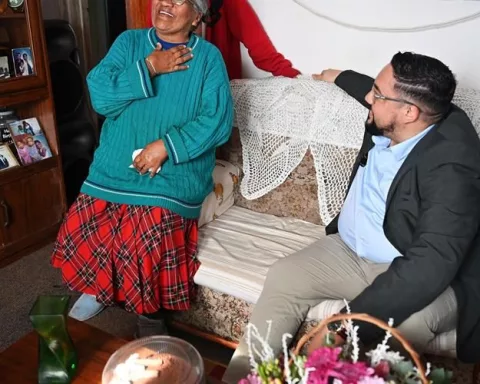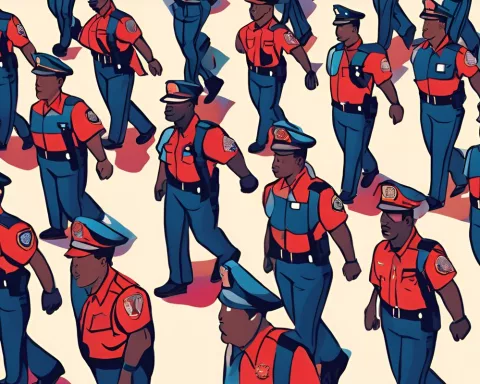Bafana Bafana, South Africa’s national soccer team, has qualified for the round of 16 at the Africa Cup of Nations with a 0-0 draw against Tunisia. Fans are brimming with optimism for the team’s future, and credit is given to captain Ronwen Williams and Belgian leader Hugo Broos for their instrumental roles in the team’s success. The fans stand united in their support for the team as they face Morocco in their next challenge.
The Pillars of Bafana’s Success
Captain Ronwen Williams has been instrumental in Bafana’s recent success, helping secure their progression to the round of 16 at the Africa Cup of Nations. With fans brimming with optimism for the team’s future, many hope they can replicate the success of South Africa’s Class of ’96, who won the Afcon title. Belgian leader Hugo Broos has forged a formidable team, but acknowledges the need to face tough opponents to further progress.
As the dust settled after a decisive 0-0 stalemate against Tunisia, a wave of exhilaration swept over the fans of Bafana Bafana, South Africa’s national soccer team. This outcome not only ensured their progress into the round of 16 at the Africa Cup of Nations (Afcon), but it also ignited a spark of optimism among the supporters. Confronting Morocco is the next hurdle, but the fans are ready and unshaken.
At the heart of this blossoming optimism is the team’s Belgian leader, Hugo Broos. Applause rained down on him following the successful qualification. Encouraged by Bafana’s performance, fans have been brimming with optimism. The possibility of going head-to-head with Morocco has whipped them into a frenzy, with social media platforms echoing this exhilarating sentiment.
The Pillars of Bafana’s Success
One of the essential pillars in Bafana’s recent performance is captain Ronwen Williams. His significant contributions were instrumental in ensuring their qualification to the round of 16. Williams’ commendable performance in the current tournament has served as a significant motivation, fueling the team’s hope for the future.
A considerable section of Bafana’s supporters see more in this team than just a one-time qualification. They anticipate this team might mirror the success of the Class of ’96, the South African team that won the Afcon title. It is an ambitious dream but not beyond the scope of reality.
In his reflections after the match, Broos revealed his relentless ambition to meet his lofty goals. His strategy from the beginning was to forge a team of formidable players, an objective he believes has materialized. However, he also noted the need for the team to face tough opponents to further their progress. While celebrating his team’s advancement past the group stages, Broos acknowledged the stiff competition Bafana Bafana faced against Tunisia, Mali, and Namibia.
Rejuvenation and Renewed Faith
There’s a notable rejuvenation within the Bafana Bafana camp following their qualification, primarily credited to Broos’ inspirational leadership. Despite facing undue criticism after their 2-0 defeat to Mali, faith in the team has significantly been reignited. A fan named Makoti Thabang perfectly encapsulates this optimism, predicting that Morocco will face an unpredictable and ever-evolving Bafana Bafana team.
As the wave of optimism resurges, and praises for Broos continue to pour in, fans are already setting their sights on the next challenge. The forthcoming clash against Morocco’s Atlas Lions is scheduled for Tuesday, January 30, at Stade de San Pedro, and it’s already buzzing with excitement. As the fans eagerly anticipate this contest, their collective sentiment was perfectly summed up in a single tweet from Bafana Bafana’s official account: “Off to the Round of 16 we go!!!”
The Fans Stand United
In the end, the game will determine the fate of both teams. One thing is certain, though – Bafana Bafana’s fans are ready to back their team with unwavering support. With high hopes and unshaken spirits, they stand prepared to cheer their team to victory.
1. What is Bafana Bafana?
Bafana Bafana is the South African national soccer team.
2. What is the Africa Cup of Nations?
The Africa Cup of Nations is a continental soccer tournament held every two years, featuring national teams from Africa.
3. Who is the captain of Bafana Bafana?
The captain of Bafana Bafana is Ronwen Williams.
4. Who is the Belgian leader of Bafana Bafana?
The Belgian leader of Bafana Bafana is Hugo Broos.
5. Who did Bafana Bafana play to qualify for the round of 16 in the Africa Cup of Nations?
Bafana Bafana played against Tunisia in a 0-0 draw to qualify for the round of 16 in the Africa Cup of Nations.
6. When is the next game for Bafana Bafana in the Africa Cup of Nations?
Bafana Bafana’s next game in the Africa Cup of Nations is against Morocco on Tuesday, January 30, at Stade de San Pedro.










